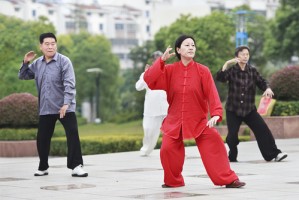The more we learn about living a healthy life, the more we understand that our mental wellbeing is just as important as our physical fitness. Depression can lead to obesity, for example; and obesity may then be a catalyst for other health challenges. It’s important for health and weight loss professionals to assist clients in managing their mental health whilst working on diet and exercise programs. In a project jointly funded by the Australian National Heart Foundation and the depression initiative Beyond Blue, researchers took a fresh look at the ancient practice of Tai Chi. They examined its potential benefits for both relaxation and physical wellbeing in people with obesity.
Background to the research
Whilst all forms of exercise can play a role in lifting our mood, people who are ageing, obese or have depleted energy due to depression may experience barriers to participating in conventional fitness programs. Researchers decided to look at a low-impact exercise alternative to see whether it could provide significant benefits in the areas of depression, anxiety and stress symptoms for obese people, whilst increasing their activity levels.
Tai Chi is a gentle combination of exercise and deep breathing, defined here as ‘mind-body movement therapy’, which other studies have shown to benefit muscle strength and balance. It is suitable for a range of fitness levels and requires no specialised equipment at the introductory level, making it accessible to people in any location, including at home.
Tai Chi has long been a component of traditional Chinese medicine and health management, but is sometimes viewed in the Western world as an ‘easy option’ that’s potentially less useful in weight management than high impact exercise. The research suggests Tai Chi has considerable intrinsic value, but could also be a worthwhile starting point in exercise programs for anyone reluctant or unable to commence a more rigorous training schedule.
The study
213 participants were recruited from the greater Brisbane area for this study. All participants were over 18, clinically obese and had been diagnosed with some form of depression. The group was split into a Tai Chi intervention group and a control group, with the Tai Chi group accessing 12 weeks of exercise and 12 weeks of follow up care.
During the intervention, participants attended 3 x 1 hour Tai Chi sessions per week. They were also given a DVD so that they could exercise at home if they wished. The class session duration was gradually increased to 1.5 hrs over the course of the study.
Researchers measured participants’ reported levels of depression, anxiety and stress using standardised psychiatric scales, mainly what’s known as the Depression Anxiety Stress Scale 21. Physical outcomes were also measured at regular intervals, including leg strength, waist circumference, BMI and blood pressure.
Results of the study
At the baseline for this study, the average levels of both stress and depression for participants was 19 units on the DASS21 scale, categorised as ‘moderately severe’. At the 12 week mark, Tai Chi intervention participants dropped an average of 5.9 units (depression) and 4 units (stress) – a statistically significant improvement. Waist circumference went down by around 1.5cm on average (without any other specific dietary interventions) and leg strength increased for most participants.
Conclusions
This was the first study to examine the impact of Tai Chi on obese people with depression symptoms, and the results are important in terms of obesity management and general public health. Participants in the study arrived with a range of health challenges that might normally prevent some people from exercising, including arthritis, diabetes and hypertension. They experienced no adverse affects during the Tai Chi intervention, suggesting this is a safe form of exercise for adults at a range of different health and fitness levels.
Psychologically, the deep breathing, repeated movements and monitoring of ‘energy flow’ involved in Tai Chi may help focus the mind. For patients suffering from low energy or physical limitations linked to obesity or depression, an improvement in leg strength may assist participation in other types of physical activity.
For these reasons, it seems Tai Chi is well worth considering as part of any health or weight loss program. It can be helpful as a stepping stone to other physical activities, or as a long term health improvement strategy that benefits both mind and body.
Reference:
Xia Liu, Luis Vietta et al. (2015). The effects of Tai Chi in centrally obese adults with depression symptoms. Evidence-based Complementary and Alternative Medicine, Jan. hindawi.com/journals/ecam/2015/879712/


